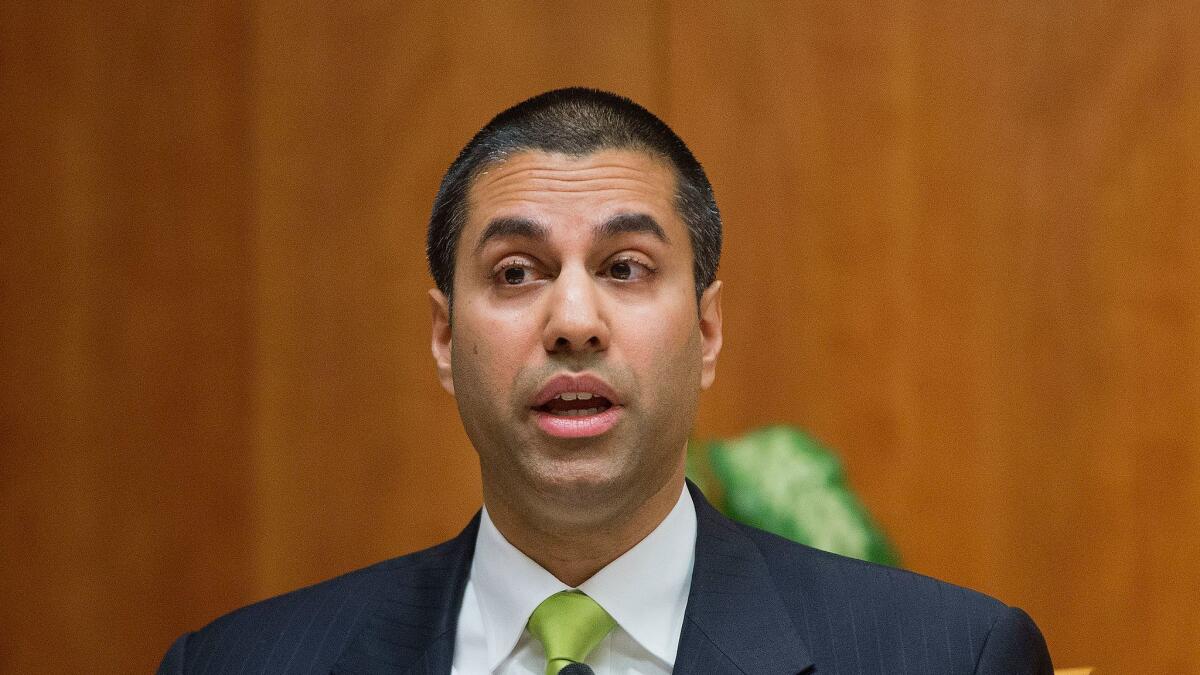Editorial: Here we go again. The FCC is trying to kill net neutrality rules

Here we go again. For the fourth time in the past decade, the Federal Communications Commission is proposing a dramatic change in the way it treats the Internet — this time, suggesting a near-complete abdication of its efforts to guard consumers against meddling by the companies that sell them Internet access.
Pushed by its new Republican majority, the commission formally proposed Thursday to repeal the “net neutrality” rules the previous Democratic majority adopted in 2015, replacing them with … nothing specific, and possibly nothing at all. Although Chairman Ajit Pai says he believes in an open Internet, he sees no real threat from broadband providers such as Comcast, AT&T and Charter, and thus no real need to regulate.
A host of websites, online services, developers and start-ups vehemently disagree, and for good reason. In far too many communities, only one or two broadband providers offer high-speed Internet access to homes. In the absence of competition, these companies have both the opportunity and the incentive to become Internet gatekeepers, charging websites, services and app developers for the privilege of reaching their customers’ devices.
In far too many communities, only one or two broadband providers offer high-speed Internet access to homes.
Imagine two high-definition video services, only one of which pays your broadband provider to make sure that its streams never freeze or degrade. Even if the other one has a better selection of titles, which one is likely to attract viewers? And what are the chances that a third service that’s starting from scratch would jump in, knowing that it has to pay to make its picture quality competitive?
Broadband providers insist that they believe in an open Internet too. But over the years, some telecommunications executives have talked openly about new business models that could help them pay for faster networks — models that involve letting a website or online service pay to cut through congestion on the network. Such prioritization might help enable a new health-monitoring service, for example, but it might also simply be a way outcompete a rival.
Pai and fellow Republican Commissioner Michael O’Rielly say the 2015 net neutrality rules, which classified broadband providers as utilities subject to strict regulation, led those companies to reduce investment in their networks. As a consequence, they argue, the companies haven’t improved their networks or innovated as much as they should have, nor have they extended their networks to more people who don’t have broadband.
Whether the industry actually reduced its investment is subject to considerable debate, and even the companies that did appear to cut their capital spending may have done so for reasons that had nothing to do with net neutrality rules. For example, critics of the rules often point to AT&T’s reduction in spending, but ignore the $49 billion AT&T spent in 2015 acquiring DirecTV, whose satellites deliver TV signals more efficiently than AT&T’s wires.
The commission’s proposal pays far less attention to the enormous and growing investments made by websites, services and developers — investments that could be threatened if broadband providers are allowed to pick winners and losers online. Besides, there’s a simple explanation for any lag in investment and innovation by broadband providers: the lack of competition. For proof, just compare what’s happening in wired broadband networks with the relentless innovation in mobile phone networks, where companies are spending billions on upgrades and airwaves.
Pai says that he wants to return to the “light-touch” regulation that was in place before the 2015 order, when broadband providers were considered “information services” exempt from the strict rules that applied to local phone monopolies. But the FCC’s proposal acknowledges that the previous approach wasn’t legally sound — a federal appeals court threw out the FCC’s efforts in 2008 and 2010 to bar ISPs from interfering with the traffic on their networks. And the notice offers no suggestions for how the FCC could stop broadband providers from misbehaving once they’re no longer treated as utilities. Instead, it calls for suggestions from the public, while floating the idea of leaving the job to federal antitrust enforcers, the Federal Trade Commission and state competition laws.
The proposal now faces several months of public comment and scrutiny, as well as a cost-benefit analysis by the FCC. And if Pai’s vision carries the day, proponents of the current rules are certain to sue, arguing that nothing that has happened over the last two years justifies the change.
There’s only one sure way to stop this regulatory carousel, and that’s for Congress to grant the FCC clear authority to protect Internet users from interference by broadband providers. The day may be coming where mobile phone networks and other wireless systems can finally provide a real substitute for wired broadband, bringing the competition that truly spurs investment and innovation in broadband while protecting consumers. Until then, the FCC can’t simply walk off the job.
Follow the Opinion section on Twitter @latimesopinionand Facebook
More to Read
A cure for the common opinion
Get thought-provoking perspectives with our weekly newsletter.
You may occasionally receive promotional content from the Los Angeles Times.






